Reply To:
Name - Reply Comment
Last Updated : 2024-04-20 17:50:00
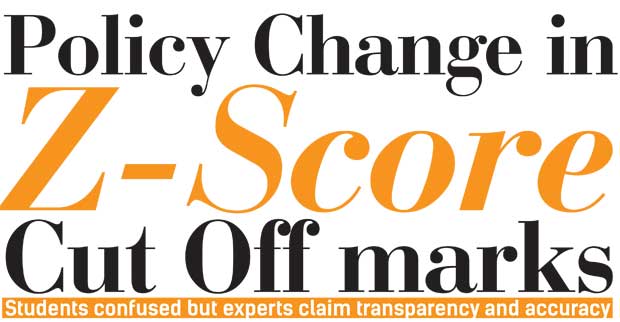
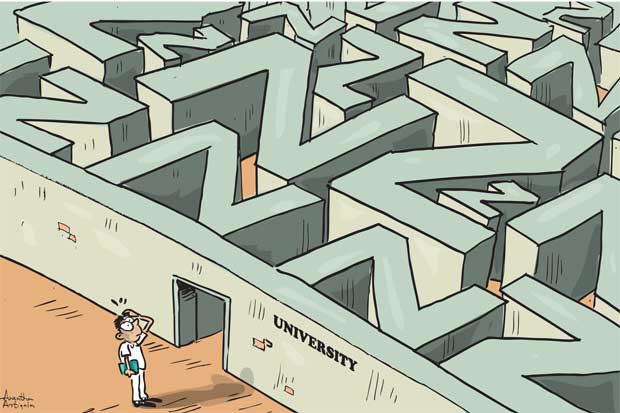
“After the war there was the common belief that children who were selected, should be admitted to the university closest to their residence. That was the thinking at the time. Though the country changed, unfortunately we did not change. Therefore, last year it was pointed out that we should work on this issue,” University Grants Commission (UGC) Chairman Prof. Mohan de Silva said while speaking on the policy change in university admission.
Elaborating on what really prompted this change, he said, “We found an issue regarding the allocation of prospective university students. For instance, in the past if a child from the Polonnaruwa District is eligible for engineering at the Ruhuna University, the engineering faculty this student received would not be Ruhuna, but in the South-East because Polonaruwa was closer to the South- Eastern University than Ruhuna. Hence, the child was not selected for the better faculty, but the closer one. Unfortunately this has happened, and has been happening for some time and no one knew about it because it was not looked into. Fortunately however, the present commission, comprising of experts from every field, were able to tackle this problem. This is why the new policy changes came into play. Now the student will be admitted to the best university that they are eligible for. We spent a lot of time and energy to organize this system.”
Eastern University than Ruhuna. Hence, the child was not selected for the better faculty, but the closer one. Unfortunately this has happened, and has been happening for some time and no one knew about it because it was not looked into. Fortunately however, the present commission, comprising of experts from every field, were able to tackle this problem. This is why the new policy changes came into play. Now the student will be admitted to the best university that they are eligible for. We spent a lot of time and energy to organize this system.”
This year the students were informed about the university they were chosen for at time the cut-off marks were released and the application and registration process has also been upgraded and improved this year.
“We have 274 degree programmes, but the maximum number of degree programmes you can apply for in each speciality is 124. Therefore, you can see the complexity of the problem. This is why we have made it extremely streamlined and was able to evolve an amazing software programme. In the future the application and registration will be online. We spent millions on this programme and we collaborated with the Moratuwa University to do so. If the student gives false information the software programme will flag that information and it could be checked with ease. In the past the postal application contained 60 papers. Last time we received 70,000 postal applications, this was both tedious and time consuming. But, the next time it will be all done online and we have informed all the faculties that we will be opening universities in October. We are also working very closely with the examination department now, hope that in two years time we will be able to give admission details before the A/L results are received by students. Then it will be less of a heartburn for students,” Prof. De Silva said.
Explaining further the methodology adopted in admitting students, he said, “In the Arts stream there is no district basis intake. Students are admitted only according to their All-Island merit. But in Technology, Commerce and the Science streams it is not so. There is a 40% All-Island, 55% district basis and 5% for the 16 educationally disadvantaged districts pointed out by the government,” he said.
Speaking to , Inter University Students’ Federation Convener Lahiru Weerasekara said the cut-off procedure has changed and that it was unfair because students have not been informed beforehand. “This time they have released cut off marks for each university in comparison to previous years where the cut off marks were released for the field of study. Students apply based on the cut off marks of the previous year. So this year by releasing cut off marks based on individual universities they have created a mess. We are oblivious as to why they changed the procedure and as to how students are selected under this procedure. Prior to applying no student was informed of the change. It is only after they’ve released the cut-off marks have they decided to tell us that they have changed the procedure. Under this new procedure students with qualifications are denied university entrance,” 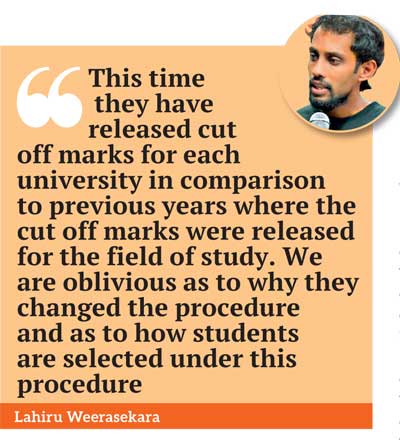 he claimed. “This year the UGC has said that if the student has not asked for a particular university he or she will not be considered for that university under any circumstance. The 344th in the Galle District in the Arts stream has been admitted to the Ruhuna University. But the 340th has not been admitted to any university in Galle because that person has not applied. Just because he hasn’t applied for Ruhuna it does not mean that he doesn’t want to go there. He can follow the same course at the Ruhuna University as well.” But when the investigated into this matter, it found that according to the University Admission Guide Book this particular student could appeal.
he claimed. “This year the UGC has said that if the student has not asked for a particular university he or she will not be considered for that university under any circumstance. The 344th in the Galle District in the Arts stream has been admitted to the Ruhuna University. But the 340th has not been admitted to any university in Galle because that person has not applied. Just because he hasn’t applied for Ruhuna it does not mean that he doesn’t want to go there. He can follow the same course at the Ruhuna University as well.” But when the investigated into this matter, it found that according to the University Admission Guide Book this particular student could appeal.
Shehani Shalindi Gallage, a prospective university student to the Kelaniya University also spoke on whether this system was fair. She said, “I am sincerely happy that I am able to step into a state university because that was one of my dreams since childhood and I am privileged to be part of the free education system in my country. But, considering the district quota system I find it slightly unfair, because students in high performing districts who have 3As are not able to secure admission to any university.”
Prof. Mohan de Silva said the system was more effective now. “People are trying to understand the system without reading the book published by the UGC. There is a section for Frequently Asked Questions where we have summarized all 17 points. Everything’s on the web. Students who come to the UGC seem confused because they have not read the book. Everything is clearly and simply stated in all three languages. There are two factors which determine your university, they are your merit (Z-Score) and whether you have asked for that programme. If you have not asked for it you will not be offered that course,” he said.”We have given the previous year’s cut-off marks only to guide the students. But that does not mean that they are the cut-off marks for the current year as well. This fact is mentioned in the book,” he added.
Prof. De Silva said there was a very straight forward system in place.
“We have made it easier by introducing a uni-code system. But students have misunderstood it,” he said. This has been particularly true as many students seemed to be unaware of certain factors. Rupa** has a Z-score of 1.52. She believes that she should be selected to the B.Com course offered by the Jayawardanapura University. Instead she has been offered a course at the Sabaragamuwa University for management which was her 5th preference. When the inquired we found that her Z-score was below the minimum Z-score mentioned by the UGC for the course at the Jayawardanapura University.
Many students have also complained that the 10% increase in intake is a fallacy because they have not seen a tangible increase in the intake in their respective fields of study. We contacted University Grants Commission Secretary Dr. Priyantha Premakumara for a clarification on this matter. “The 10% increase in intake is for all 16 streams of study, however the bulk of this intake comes from the 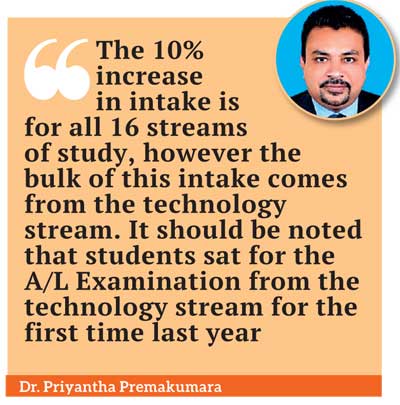 technology stream. It should be noted that students sat for the A/L Examination from the technology stream for the first time last year,” he said. “Therefore, a huge difference in the intake in their field of study will not be apparent. If we take the medical field for instance, there will be approximately 20 people who will be taken in additionally, in comparison to the previous years.”
technology stream. It should be noted that students sat for the A/L Examination from the technology stream for the first time last year,” he said. “Therefore, a huge difference in the intake in their field of study will not be apparent. If we take the medical field for instance, there will be approximately 20 people who will be taken in additionally, in comparison to the previous years.”
Ruhansi K. Wedasinghe, another student who did not qualify for university admission spoke on this matter and the district quota system, “I honestly do not think that the district quota system is fair. We all learn the same syllabus, but each district is given different Z-scores. This system does not consider the merit of the student in its purest form. Though the UGC said there was a 10% increase in the intake got the hopes up of many students, now they are saying that this increase only applies to those who have done new subjects. We have also have been waiting for a long time till they released the cut-off marks and it has been a waste of time for those who were not selected. If this time lag was not there it would have been easier for us to make future plans for our education, instead of being caught in a web of incertainity.”
We also asked if there was enough transparency between the university and the students who were eligible for admission. Many students feel confused about the system as it is rather complex and lacks information on the degree courses. Many students have also complained that they can only receive this information from word of mouth or from students they know who are already in that particular university. Some of the students have even proposed the idea, that the government should conduct seminars in regards to degree courses they are interested in.
A student who sat from the Arts Stream in the Colombo district received an extremely high Z-score. 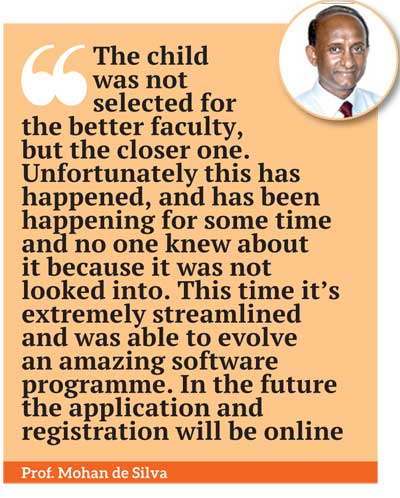 She was within the first 100 in the Island. Yet she was not offered the university she requested because lectures weren’t conducted in the language she was fluent in.
She was within the first 100 in the Island. Yet she was not offered the university she requested because lectures weren’t conducted in the language she was fluent in.
“I went to the UGC with my predicament and they said that in Kelaniya, Arts and other than for English Lit. and Western classics, all the other subjects are conducted in Sinhala and are not available in English or Tamil. Even though most of the final papers of those subjects are in English, the lectures are in Sinhala. The UGC handbook did not specifically mention this and they have stated that subjects were available in English and Sinhala. They also haven’t mentioned the Arts subjects available in the Colombo University in the guidebook. I am extremely disappointed that though I am eligible to pursue the subject I am unable to do so because of a language barrier,” she said. The website where candidates could check their admission states that students may not be admitted to preferred universities though they have achieved the minimum Z-score because lectures are not conducted in all three languages.
Dr. Premakumara said there should be no confusion as the UGC was always ready to provide advice. “This confusion should not be there, because if there are any queries regarding degrees, then the student can easily call the UGC to clear any doubts. The university admission book provided by the UGC also gives ample information about the degree courses and the university,” he said.
Though the UGC is easily accessible to students, they find that the UGC book is both complex and insufficient. One student had an important query in regards to university admission and called the UGC for help, however they told the student to refer to the book for more information.
We asked if the district quota system was truly fair. For instance there is a proposed intake of 1,260 students for medicine. However, there is a student from the Colombo district who is near 800 in the Island and though the student’s rank clearly shows that she should be included in the proposed intake, she was not. This is because of the district quota system. This system depends on how well the district performs and the population in the district. In simple terms if the district performs well in the respective field, less seats will be available in that district for the university. “The district quota system depends on numbers, it is an intense and objective calculation that is fair to all students. This system is significantly advantageous to students in disadvantaged areas,” Dr. Premakumara said.
Another student, in the commerce stream, echoed the grievance of many others. “My friend has a lower Z-score than mine. But she got into Ruhuna Management Course whereas I have been selected to a course in the Trinco Management Faculty which was a lower preference in my selection,” she said.
However, a double standard can be observed, because though the district quota system is applied to most of the fields, it does not apply to students who want to enter into the Arts Faculty. Entrance to the Arts faculty is considered on an ‘All-island merit basis.’ Regardless of the district, all students will be considered on their merit, hence their performance at the exam. We asked why this only applied to students who want to pursue Arts Subjects, Dr. Premakumara said, “In fields like science and commerce, students need external material for them to perform well at the exam. For example, a student in the science stream would need lab equipment to follow the syllabus. But, in some districts school lab facilities are not found. However, in the Arts stream this disparity is not overtly visible.”
Don Monday, 03 October 2016 07:30 AM
You get 3 A's you should have the ability to attend university. Or you can game the system by sitting for the exam in districts with higher quotas for lesser marks.

Add comment
Comments will be edited (grammar, spelling and slang) and authorized at the discretion of Daily Mirror online. The website also has the right not to publish selected comments.
Reply To:
Name - Reply Comment
On March 26, a couple arriving from Thailand was arrested with 88 live animal
According to villagers from Naula-Moragolla out of 105 families 80 can afford
Is the situation in Sri Lanka so grim that locals harbour hope that they coul
A recent post on social media revealed that three purple-faced langurs near t